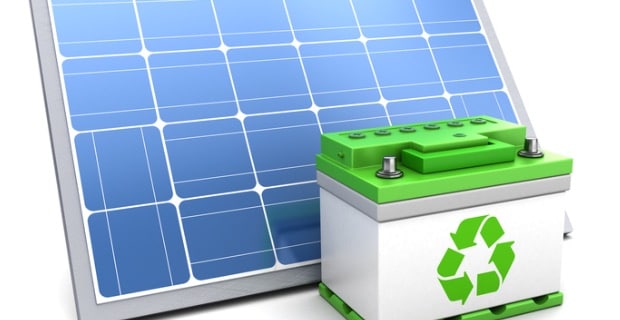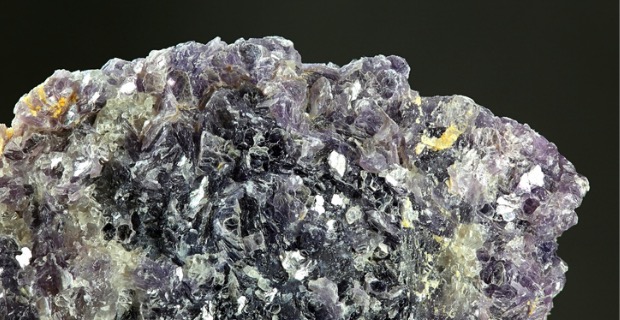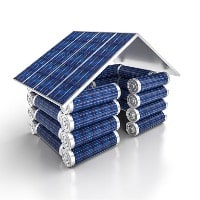Just imagine. It’s far in the future and all Australians are benefiting from solar power and going off the grid. But there’s a new menace. Millions of disused solar batteries are sitting around and polluting the environment. It’s like a dystopian Science Fiction movie, but it’s not as unlikely as you might think. Could solar battery recycling be the answer?
Governments, organisations and new start-up companies across Australia are beginning to address the problem. Energy Matters covered Relectrify last year, a company using innovative technology to make solar batteries last longer. There’s also Nissan, which as the Guardian reports, is recycling its car batteries into home battery storage for solar systems.
In this article Energy Matters looks at the different types of solar batteries on the market. What do you do when they have run out of juice? When you buy a battery, does it have potential for recycling? You should also look at collection and drop-off services, and which companies offer solar battery recycling services. But first off, let’s take a look at the batteries themselves.

Lithium-ion batteries
Lithium-ion batteries are generally lighter than other types of rechargeable batteries. That’s because their electrodes are made of lightweight lithium and carbon. Lithium is also a highly reactive element, meaning a lot of energy can be stored in its atomic bonds. This translates into a very high energy density for lithium-ion batteries.
Currently, about 5 per cent of lithium-ion batteries are recycled. The recycling process is complicated because there is a mix of materials.
Lithium-ion batteries deliver more cycles in their lifetime than lead acid batteries. For solar, these batteries are good for high charge and discharge, which helps harvest more energy. They also lose less capacity when idle. This aspect is good for solar, when stored energy is used intermittently. Lithium-ion is particularly good for solar panel efficiency when going off the grid. Batteries like those from German manufacturer sonnen are resilient and have a long life.

Lead-acid batteries
Lead is the heaviest non-radioactive metal and has been used in batteries for decades. Most batteries that are recycled are lead-acid, about 90 to 98 per cent of the total.
Deep cycle lead-acid batteries have been employed in renewable energy and reliably used in off-grid applications globally for decades. Typical deep cycle lead-acid batteries cost a lot less than lithium-ion, however lithium-ion batteries are lighter, more efficient and last longer.
Proper disposal of lead-acid batteries is important because they are toxic. Old batteries can be returned to the retailer or taken to collections for recycling. Close to 100 per cent of the materials can be recycled, which gives them a high commercial value.
Nickel Cadmium batteries
Nickel-cadmium or NiCd batteries have been around since the early 1900s. Though they may not have the energy of other technologies, they provide long life and reliability without complex management systems.
Nickel-cadmium batteries are relatively inexpensive compared with other technologies. They have the ability to tolerate extreme temperatures, which makes them ideal for off-grid applications in harsh environments. They have been used for storage in megawatt-sized projects.
NiCd batteries are rugged and have a high cycle life. Some companies promise a service life of up to 20 years. However, cadmium is a hazardous material and strict regulations apply for its recycling. It can be extracted and reused in new batteries, while the nickel can be recovered and used to make stainless steel.
Other battery types
Flow batteries (zinc bromine and vanadium redox), sodium-ion batteries and aqueous hybrid batteries are relatively new technologies so there may not be an established recycling system. Ask your supplier or the manufacturer for more information about recycling these batteries.
Information about solar battery recycling
Most commonly used batteries are classed as dangerous goods when they’re at the end of their life and should be managed carefully. Batteries should be removed and decommissioned by licensed professionals. Don’t dive in with the pliers and start cutting cables. Assume the battery could still carry a lethal charge. Check that the battery is not damaged or leaking and if you do handle them, wear protective clothing.
It is possible to source information about recycling batteries when you request a solar system quote from your installation service. An accredited installer should be able to tell you about recycling opportunities for the storage battery they recommend.
For more information about recycling centres near you, visit the Australian Battery Recycling Initiative website. Some of the questions you should ask a battery recycling company are:
- Does the company have a licence to collect, transport and recycle or dispose of the type of battery involved?
- Does the company have third party accreditation or are they a member of an industry body?
- Has the company advised what happens to the batteries after they are collected? Ask them to give you a recycling certificate that nominates the method and destination for recycling.
The benefits of solar battery recycling
The smaller batteries you find in your gadgets at home aren’t really the problem. But if you’re using solar, think about what you’re going to do when the battery runs out. Lithium is scarce and could be used up in the future.
Solar battery recycling is worth it. The recovery and reuse of materials like lead, iron, copper, lithium, and cobalt is good for the environment. Also, you don’t get loads of toxic waste in your local landfill. Added to that, there could be a financial return for recycling.
Whether you are a homeowner or local business, it’s important to know about batteries and recycling for your own safety and the future of the environment. There’s more information here including requirements by state: www.batteryrecycling.org.au
Our professional solar installers in Brisbane will assess and determine your energy needs. We customise a solar panel system in Brisbane to fit the roof size of your property, ensuring you receive the most suitable solar panel system for your Brisbane home, meeting to property’s energy requirements.












































